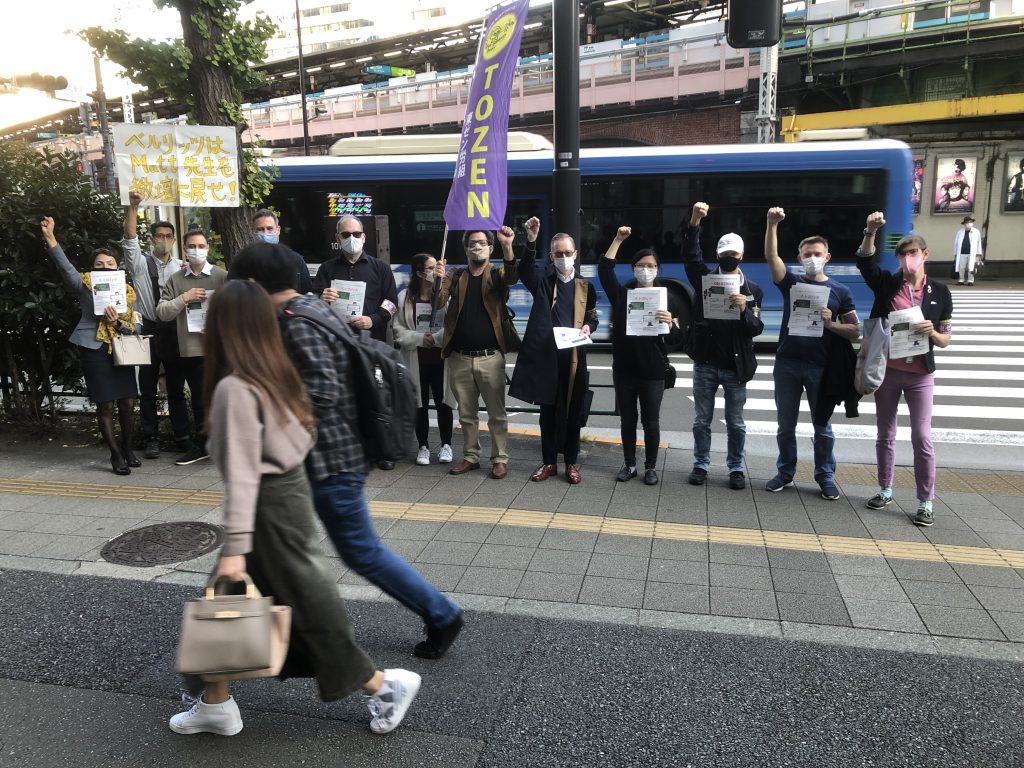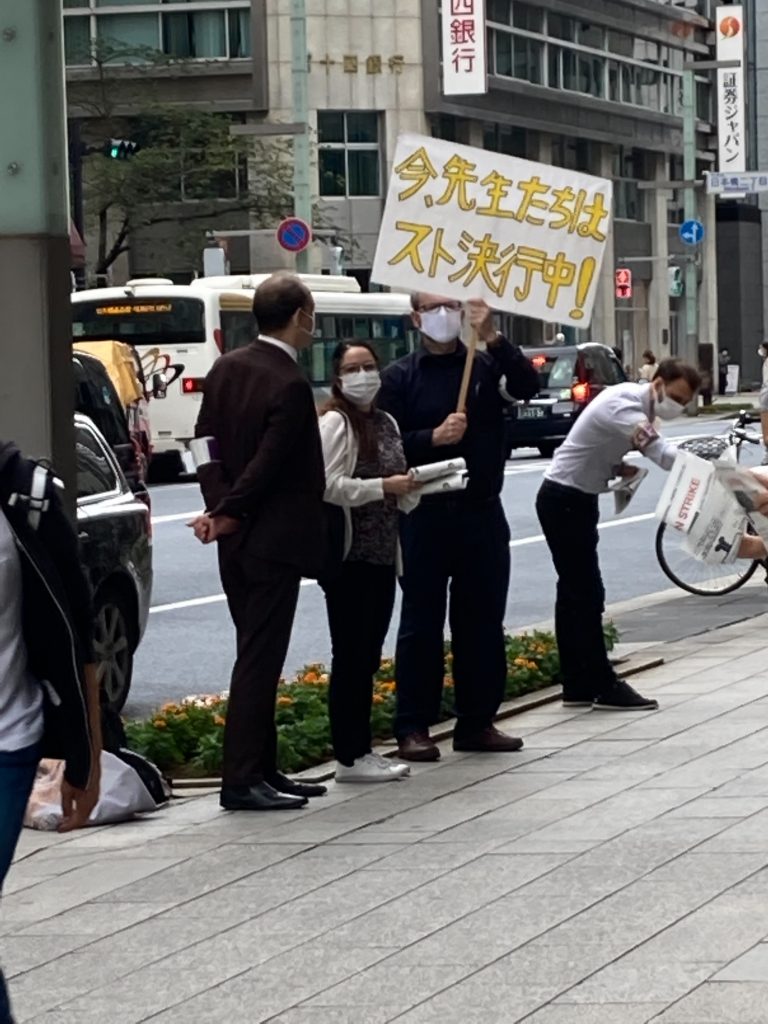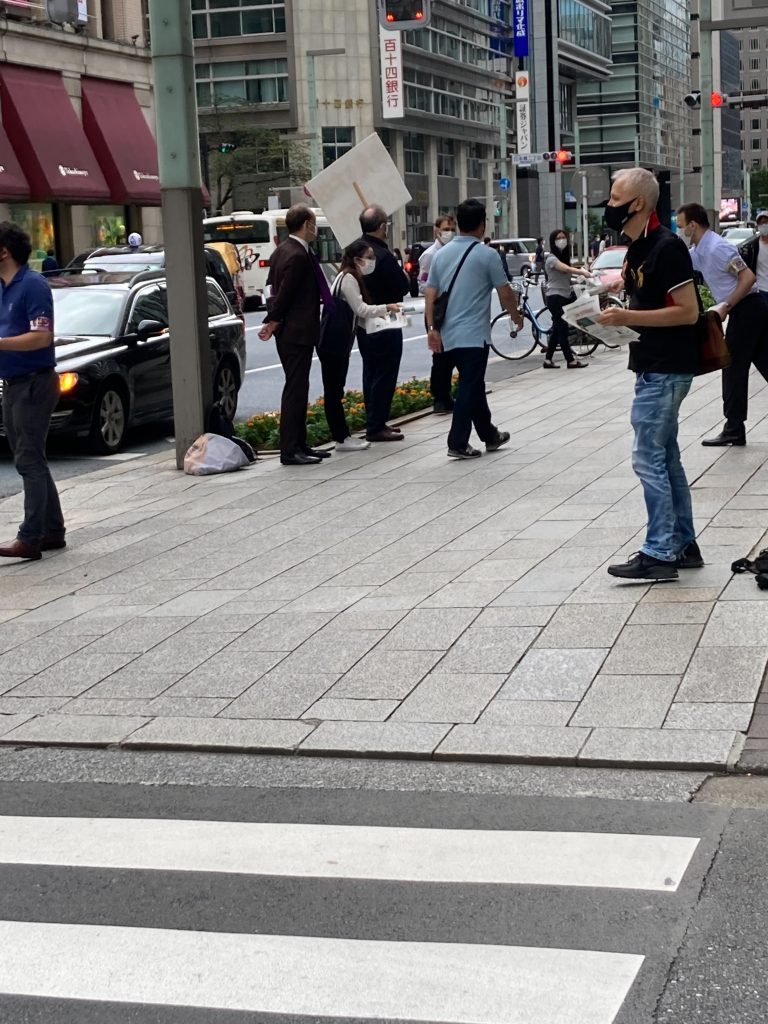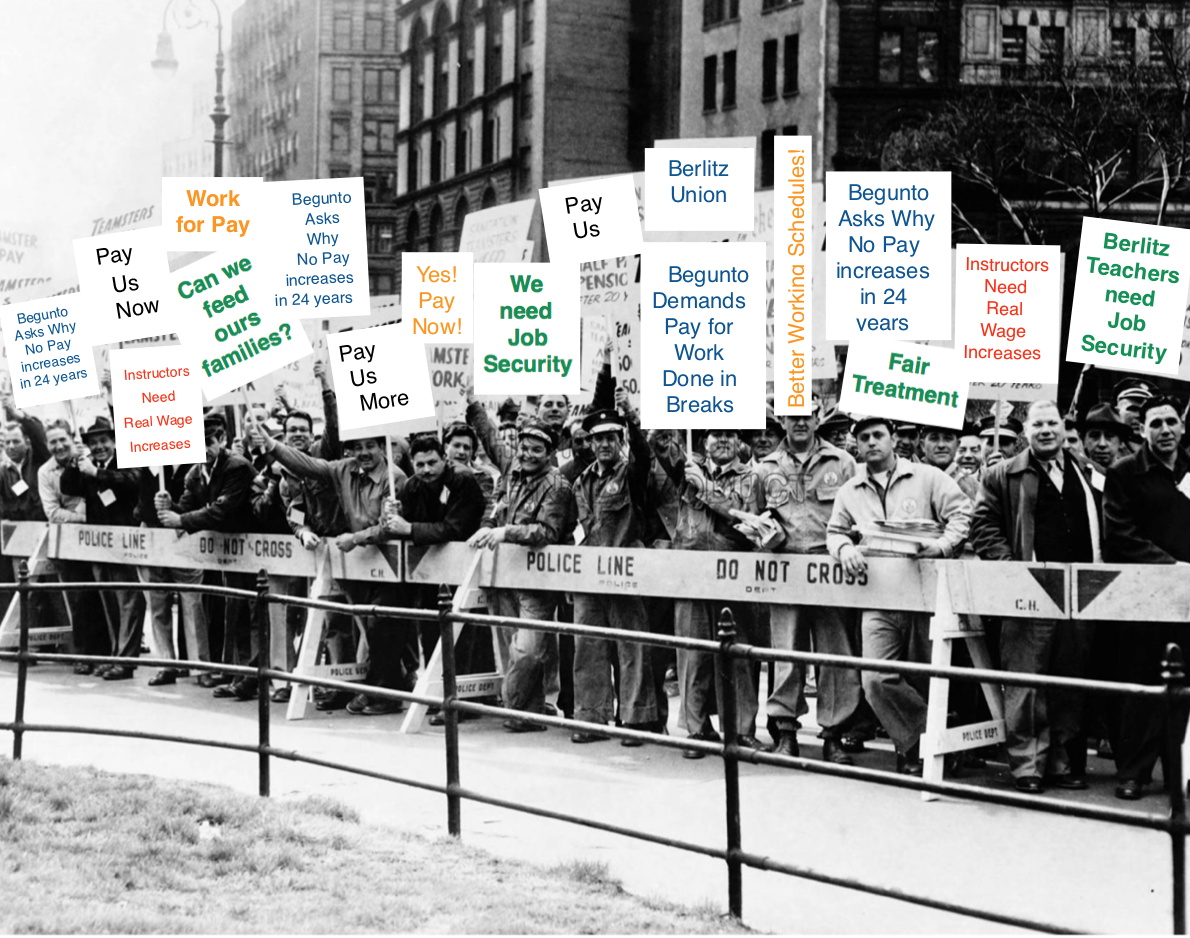Language school firm will appeal decision
After hearing more than three years of testimony, the judge took only a minute to read the court’s verdict rejecting Berlitz Japan’s ¥110 million lawsuit against striking teachers and their union and reaffirming organized labor’s right to take industrial action.
According to the Feb. 27 Tokyo District Court ruling, “There is no reason to deny the legitimacy of the strike in its entirety and the details of its parts — the objective, the procedures, and the form of the strike. Therefore there can be no compensation claim against the defendant, either the union or the individuals. And therefore it is the judgement of this court that all claims are rejected.”
The battle of Berlitz began on Dec. 13, 2007, when teachers belonging to the Berlitz General Union Tokyo (Begunto) launched a strike against Berlitz Japan. The teachers, who had gone without an across-the-board raise for 16 years, struck for a 4.6 percent pay hike, a one-off one-month bonus and enrolment in Japan’s health insurance and pension system.
The strike grew into the largest sustained industrial action in the history of Japan’s language school industry. Over 11 months, teachers of English, Spanish and French struck 3,455 lessons in walkouts across Kanto.
In November 2008, Begunto filed an unfair labor practices suit at the Tokyo Labor Commission. The union alleges Berlitz Japan bargained in bad faith and illegally interfered with the strike by sending a letter to teachers telling them to stop walking out.
On Dec. 3, 2008, Berlitz Japan, claiming the strike to be illegal, sued for ¥110 million in damages. Named in the suit were the five teachers volunteering as Begunto executives, as well as two union officials: the president of the National Union of General Workers Tokyo Nambu, Yujiro Hiraga, and Louis Carlet, former NUGW case officer for Begunto and currently executive president of Zenkoku Ippan Tokyo General Union (Tozen).
Berlitz Japan claimed the union’s tactics of giving strike notice at the last minute and making it difficult for the company to bring in replacement teachers were illegal and designed to harm the company.
Begunto filed additional complaints against the company at the Tokyo Labor Commission in 2010 after Berlitz Japan dismissed two of the union executives named in the lawsuit. One teacher lost his job after he requested a leave of absence of more than a year in order to serve as a reservist in Afghanistan, the other after she requested an additional four months unpaid leave to recover from late-stage breast cancer.
Yumiko Akutsu, one of the union’s lawyers, told supporters after the verdict that the win was “a complete victory — on not one point did we lose, not one single point.”
Reading from the court’s ruling, she explained that the court found the objective of the strike to be legitimate because “the strike’s purpose was to realize the union demands they had clearly stated to management in 2007 and 2008.”
Because teachers had different work schedules at different language centers and often didn’t receive their schedules until 7 p.m. the night before working, the court also rejected the company’s claims that the last-minute notice given by teachers before striking lessons was illegal. “Strike notice just before the strike cannot be considered illegitimate”, the court ruled.
After the win, Carlet stressed the significance of the victory as an important defense of the right to take industrial action in Japan. “This is a very important victory for the right to strike,” he told union members. “I think people often forget how important the right to strike is. The right to strike was not granted us by governments or by management. Workers fought in many countries around the world and gave their blood, sweat and tears to win this right to strike.”
Hiraga also emphasized the significance of the win, telling union members, “I think what the verdict represents is that the company sued you for damages as a way to weaken the union and as an illegal union-busting tactic, and it was denied by the courts.” Calling it a triumph not only for Begunto and Nambu, Hiraga told supporters, “This is a victory for the entire labor movement in Japan.”
According to Akutsu, a victory by the company “would have had a huge impact and a huge chilling effect on people’s willingness to strike.”
Gerald McAlinn, a professor at Keio University Law School, said that because Article 28 of the Constitution guarantees the right of workers to organize and bargain collectively, “Any decision by the court to the contrary would have been very strange and contrary to the fundamental rights of all workers in Japan.”
McAlinn emphasized three reasons for the importance of the case. First, “A ruling in favor of the company would have opened up an avenue for employers to circumvent the balance of power established by the labor union law.” He added that allowing employers to sue striking workers “would be a powerful weapon that could easily be used to chill the exercise of constitutional rights by workers all across Japan.”
The court’s ruling is also significant because of the somewhat unusual nature of the strike action. Unlike in a typical strike, where workers walk out en masse and stay out together, Berlitz instructors sometimes taught and sometimes downed chalk. Individual Begunto members struck individual classes in different language centers at different times, handing their strike notices over to management only a few minutes before the scheduled start of the lesson. This minimized the company’s ability to bring in replacement teachers and break the strike. According to McAlinn, “This case seems to legitimize the practice of refusing to work other than via the traditional all-out-together picket line strike.”
Finally, McAlinn believes the verdict matters because it was mostly foreign teachers in the dock. “The nationality of the defendants should not matter of course, but this decision makes this point clear,” he said.
The triumphant union executive members stress the need to move past legal confrontations and get back to negotiations with management. Hector Coke, Begunto president at the time of the strike and one of the teachers named in the lawsuit, told union members and supporters in a meeting after the verdict that it’s time to start negotiating and “build a better relationship with management. We should not be arrogant in the fact we won this case.”
Paul Kennedy, current Begunto president, echoed this point at a press conference after the verdict. “We look from this point forward to be able to negotiate with Berlitz Japan,” he told reporters. “This is a new start for both sides.”
However, Berlitz Japan didn’t wait long before deciding to continue the legal skirmish. Kennedy says he received notice that Berlitz Japan will appeal the verdict on Friday.
Michael Mullen, Berlitz Japan’s senior human resources manager, declined to comment on the case.
Berlitz Japan doesn’t necessarily have to submit new evidence in their appeal to the high court. “In my experience, the high court is not shy about reaching a decision different from that at the district court level if the judges see the facts or law differently,” said McAlinn. “Having said that, I would be surprised if the high court were to reach a different decision in this case.”
Meanwhile, Begunto and Berlitz Japan continue their legal battle at the Tokyo Labor Commission, buoyed by the district court victory.
“With this verdict,” says Carlet, “we will be in a very good position at the labor commission because the strikes were legal and that will make all the difference.”
However, legal experts don’t all share Carlet’s confidence. According to McAlinn, the verdict “shouldn’t have a direct impact on the union claims at the Tokyo Labor Commission” because “the two actions are governed by different laws and legal standards.”
Tadashi Hanami, former chair of the Central Labor Relations Commission and professor emeritus at Sophia University, agrees, explaining that the Tokyo Labor Commission “may take this verdict in consideration if it chooses so, but we can hardly predict whether it will do so or not because it’s not unusual that courts and commissions take completely different opinions.”
Union members also now face a large legal bill. “The general principle under Japanese law is for each side to pay their own court costs,” says McAlinn. Union members are now discussing ways to recover court costs from Berlitz Japan, says Kennedy.






